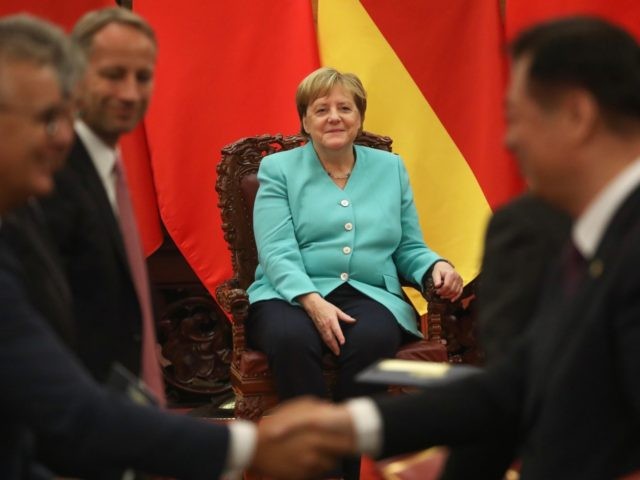Imports from the Chinese Communist slave labour region of Xinjiang have more than doubled to the European Union since the beginning of the year, despite claims from the bloc of getting tough on Beijing.
Imports to the EU from Xinjiang rose by 131 per cent during the first six months of the year, which was markedly higher than shipments from China as a whole, which rose by 35 per cent during the same time period.
Germany, the bloc’s largest economy, was the main driver of the increase in products bought from Xinjiang, according to analysis of Chinese customs data conducted by the South China Morning Post.
Imports from Xinjiang to Germany rose by 143 per cent in the first two quarters of the year, with exports to Italy and the Netherlands rising by 32 and 187 per cent respectively. The report also found that Belgium — the seat of power for the EU bureaucracy — saw trade with the slave labour region rise by 1,591 per cent, however, this was noted to have started from a much lower base level of trade.
In total, the EU imported €316 million (£270m/$373.2m) in goods from Xinjiang from January to June, representing three times as much the worth of Xinjiang-made goods exported to the United States in the same time period. Imports fell from Xinjiang to the U.S. after the Trump administration enacted sanctions on goods from the region over concerns about the use of forced labour.
Newly independent Brexit Britain also saw imports from Xinjiang nearly triple during the same time period, purchasing 192.2 per cent more goods from the region since leaving the European Union at the beginning of the year.
In March, the European Union alongside Canada, the UK and the U.S. levied sanctions against CCP officials and the Public Security Bureau of the Xinjiang Production and Construction Corps, for their role in the alleged genocide being carried out against the Muslim Uyghurs in the Xinjiang region.
The EU sanctions, which resulted in retaliatory sanctions from Beijing on European and UK lawmakers, effectively sidelined the bloc’s intention to sign a massive trade deal with the communist nation.
The European Commission initially described the trade deal as the “most ambitious agreement that China has ever concluded with a third country.”
The deal failed to require that the Chinese government stamp out modern slavery in the concentration camps of Xijiang, as a prerequisite for the agreement.
German chancellor Angela Merkel — under whose leadership has seen China become Germany’s top trading partner in 2018 — was said to be a driving force behind the shelved trade deal.
Germany’s top car manufacturers, Volkswagen and BMW, have both been accused of profiting from the use of slave labour in Xinjiang.
Up to three million people have been forced into the concentration camp system in Xinjiang at its peak. Recent estimates from the U.S. government suggest that there are still some two million Uyghurs, Kazakhs, and Kyrgyz people, among other ethnic minorities in the camps, where they are subject to torture, sterilisation, and forced labour.
Aside from the slave labour being used in Xinjiang itself, a report from the Australian Strategic Policy Institute think tank claimed last year that the CCP has forcibly transferred over 80,000 Uyghurs to factories throughout China to work in slave-like conditions.
Amid growing international condemnation, the Chinese Communist Party has attempted to rebrand the forced labour camps as merely “facilitation of employment” facilities.
Since the collapse of the proposed trade deal, Eurocrats in Brussels have been pushing for more sanctions on China and a possible ban on all goods made in Xinjiang which can be tied to the forced labour regime. The EU has also been drafting a legislative framework that would limit supply chain access for such goods, however, as of yet, nothing limits have been put in place.
The chief economist at the Mercator Institute for China Studies in Berlin, Max Zenglein said that despite the highly publicised outcry over the human rights abuses in Xinjiang, there has been little change in European business ties with the region.
“Despite the discussion about Xinjiang here, I think it’s having very little impact on trade. You have the trade story and you have the political discussion here and so far, there’s very limited overlap,” he said.
“The supply chain laws that are coming into effect, are just beginning to be rolled out so nobody needs to care about this necessarily. Their buying patterns do not have to be adapted yet, but I think this will change.”
Follow Kurt Zindulka on Twitter here @KurtZindulka

COMMENTS
Please let us know if you're having issues with commenting.